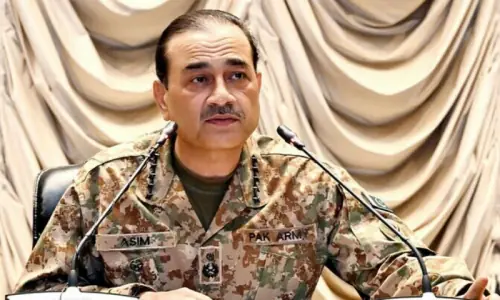“RIGHTLY constituted laws should be final sovereign; and personal rule, whether it be exercised by a single person or a body of persons, should be sovereign only in those matters in which law is unable, owing to the difficulty of framing general rules for all contingencies, to make an exact pronouncement.”
It was over 2,300 years ago that Aristotle, in his Politics, recognised that power corrupts, that the desire of rulers to make their personal whims into a substitute for law brings about the degradation and collapse of the state.
This is highly apparent in this unfortunate republic. Sixty-four years ago, founder maker Mohammad Ali Jinnah proclaimed to his constituent assembly that the first duty of the state was the imposition of law and order, the protection of the life and property of its citizens, i.e. sovereignty of its laws. Good governance is heavily dependent on the state’s police force to combat crime, uphold the law and protect the citizens from militancy. Here it does not exist.
The Raj is generally blamed for the policing system established in the subcontinent after the so-called Indian mutiny of 1857.
The Police Act of 1861 was crafted to consolidate and perpetuate British rule in India, and was never meant to create a people-friendly law-enforcement system. The act gave the government superintendence over the police, but did not clarify the nature of such ‘superintendence’ or establish guidelines to restrict misuse of the police for partisan or unlawful purposes.
During five decades following Pakistan’s birth, numerous commissions and committees investigated police reforms, presenting recommendations for the professionalisation of the force: none was implemented.
From Ayub Khan downwards, through the decades, the rulers of whatever hue have gone out of their way to politicise and bring the police to heel. The result — a demoralised institution which lacks popular support, professionalism and integrity, and which is thoroughly exploited by the ruling (so-called) elite.In 2002, under principles enunciated by the Focal Group on Police Reforms (included were senior serving and retired officers), Pervez Musharraf’s new Police Order replaced the 1861 act, introducing major improvements into a dysfunctional system.
The police force was distributed along practical lines, civilian accountability and internal disciplinary measures were put in place, as was autonomy from the district magistrate’s oversight and safeguards against political influence in the posting, transfer and promotions of policemen.
Citizen-friendly clauses of the order stated that every police officer was to behave with decorum and courtesy, assist members of the public, particularly the poor, disabled, physically weak and children.
The police were to save individuals (particularly women/children) from physical harm; protect the life, property and liberty of citizens, promote public peace, prevent the commission of offences and public nuisance, keep order, prevent obstruction on public roads, control traffic, aid other agencies for the prevention of public property destruction, assist in preventing members of public from exploitation by individuals or organised groups and prevent harassment of women/children in public.
The order mandated the establishment of the public safety commissions in each district (and similar ones at the provincial and federal levels) consisting of half the members from the district council and the other half from independent non-political persons of proven integrity and professional competence (one-third of each half to be women).
The commissions were to approve/monitor the annual policing plan prepared by the district police officer in consultation with the nazim, encourage public-police cooperation, support officials against political meddling, ensure legitimate registration of FIRs and protect against police excesses.
Police complaint authorities were to be set up at the federal and provincial levels to investigate and handle complaints of neglect, excess or misconduct.
None of this suited the rulers, who preferred a culture of browbeating, controlling and converting the police into virtual private militias to serve their particular purposes and harass opponents. After all, which politician can tolerate an independent police force (or an independent judiciary for that matter) which will implement the law without fear or favour?
Consequently, the police order was amended and progressively diluted in 2004–2007, under pressure from Musharraf’s political allies, clauses and mechanisms for political intrusion into the working of the police were inserted — all, of course, in the larger national interest. Now, as part of the eradication of local government systems, we have reverted to an ‘improved’ version of the Police Act 1861.
The suo moto proceedings of the Supreme Court prompted by this summer’s escalation in ethnic violence, targeted killings, kidnappings, land grabbing and extortion has come down hard on the Karachi police and highlighted their inadequacies.
Assisted by the Rangers, the police have been compelled by the judiciary to take action against criminals of all political persuasions, despite the fact that a large chunk of the police force has ties with such elements.
Yet, 185 policemen involved in the mid-1990s operation against the MQM in Karachi have been killed over the past decade without anyone being arrested. The Tehrik-i-Taliban has publicly identified six senior policemen for extermination. The policeman-population ratio in Karachi is 1-550 (Lahore 1-250, Delhi 1-200). How can any police force work under such oppressive conditions?
In order to re-establish the independence, credibility and community respect critical for effective law enforcement, the police must start strictly implementing the law without fear or favour in all fields, major and minor (traffic violations, encroachments on roads, street crime, bhatta collection, crime investigation procedures — even spitting on the sidewalk).
The involvement of non-political community leaders in citizen-police liaison work must be promoted. It will be a long haul.
In 1879, Gilbert and Sullivan lamented the British policeman’s fate in their comic opera Pirates of Penzance. In the public interest, in the 21st century, Pakistan must make its policeman’s lot far less unhappy.
arfc@cyber.net.pk































